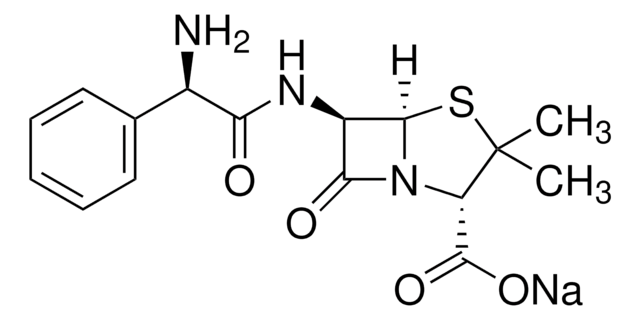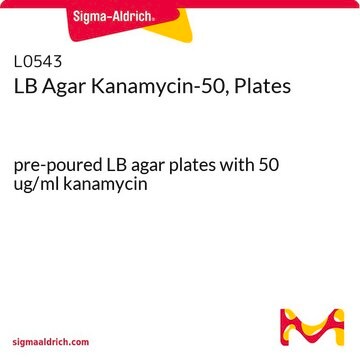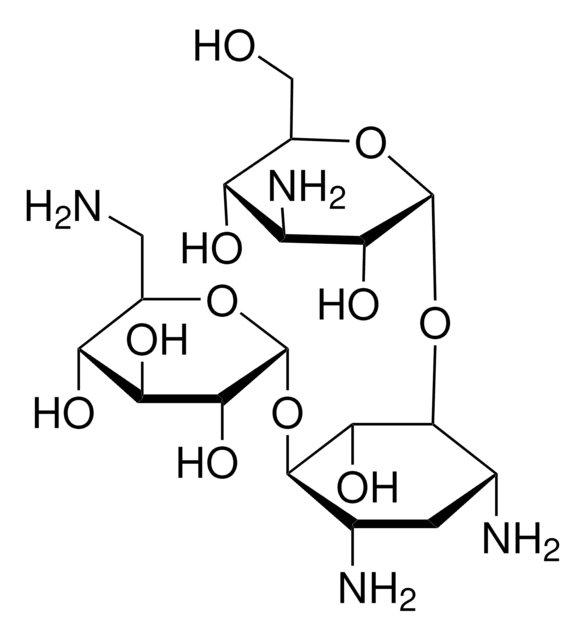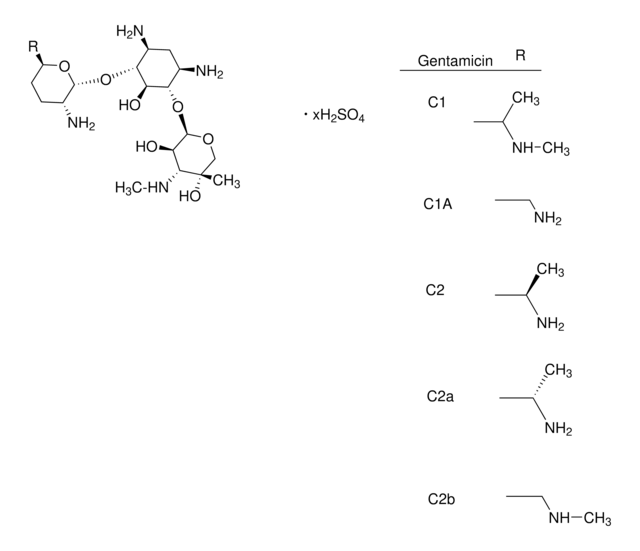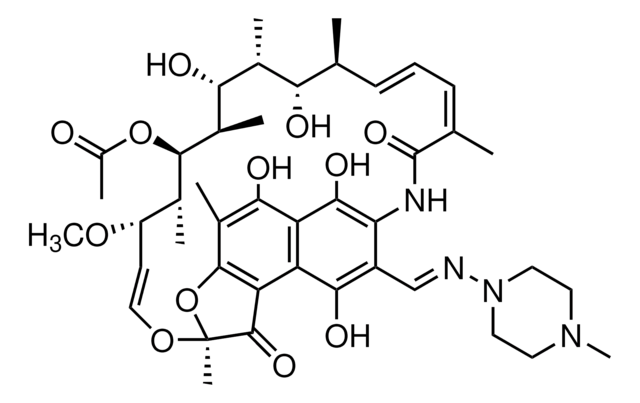추천 제품
Quality Level
양식
powder
효능
≥750 μg per mg (dry basis)
불순물
≤5% Kanamycin B
SMILES string
OS(O)(=O)=O.NC[C@H]1O[C@H](O[C@@H]2[C@@H](N)C[C@@H](N)[C@H](O[C@H]3O[C@H](CO)[C@@H](O)[C@H](N)[C@H]3O)[C@H]2O)[C@H](O)[C@@H](O)[C@@H]1O
InChI
1S/C18H36N4O11.H2O4S/c19-2-6-10(25)12(27)13(28)18(30-6)33-16-5(21)1-4(20)15(14(16)29)32-17-11(26)8(22)9(24)7(3-23)31-17;1-5(2,3)4/h4-18,23-29H,1-3,19-22H2;(H2,1,2,3,4)/t4-,5+,6-,7-,8+,9-,10-,11-,12+,13-,14-,15+,16-,17-,18-;/m1./s1
InChI key
OOYGSFOGFJDDHP-KMCOLRRFSA-N
유사한 제품을 찾으십니까? 방문 제품 비교 안내
애플리케이션
Kanamycin sulfate is a broad spectrum aminoglycoside-antibiotic derived from Streptomyces kanamyceticus. It is used as an additive in culture media for the isolation of group D streptococci on Kanamycin Esculin Azide Agar and for selection of transformed plant cells containing the neomycin phosphotransferase on a kanamycin-medium. Kanamycin sulfate can also be used as a selection agent for cells transformed with kanamycin B resistance gene. It is recommended for use in cell culture applications at 100 mg/mL.
생화학적/생리학적 작용
Mode of Action: The product acts by binding to the 70S ribosomal subunit, inhibiting translocation and eliciting miscoding.
Mode of Resistance:Aminoglycoside-modifying enzymes (including acetyltransferase, phosphotransferase, nucleotidyltransferase) can alter this antibiotic, preventing its interaction with ribosomes.
Antimicrobial spectrum: Kanamycin sulfate is effective against gram-negative and gram-postiive bacteria, and mycoplasma.
Mode of Resistance:Aminoglycoside-modifying enzymes (including acetyltransferase, phosphotransferase, nucleotidyltransferase) can alter this antibiotic, preventing its interaction with ribosomes.
Antimicrobial spectrum: Kanamycin sulfate is effective against gram-negative and gram-postiive bacteria, and mycoplasma.
Mode of Action: The product acts by binding to the 70S ribosomal subunit, inhibiting translocation and eliciting miscoding.
Mode of Resistance:Aminoglycoside-modifying enzymes (including acetyltransferase, phosphotransferase, nucleotidyltransferase) can alter this antibiotic, preventing its interaction with ribosomes.
Antimicrobial spectrum: Kanamycin sulfate is effective against gram-negative and gram-postiive bacteria, and mycoplasma.
Mode of Resistance:Aminoglycoside-modifying enzymes (including acetyltransferase, phosphotransferase, nucleotidyltransferase) can alter this antibiotic, preventing its interaction with ribosomes.
Antimicrobial spectrum: Kanamycin sulfate is effective against gram-negative and gram-postiive bacteria, and mycoplasma.
주의사항
Solutions are stable at 37°C for approximately 5 days. Aqueous stock solutions can be stored at 2-8°C for long term storage.
제조 메모
Kanamycin sulfate is soluble in water at 50 mg/mL, yielding a clear solution. It is practically insoluble in alcohol, acetone, chloroform, ether and ethyl acetate. A 1% solution in water has a pH of 6.5 to 8.5. Sterile solutions can be prepared by a sterile filtration, through a .2μm filter.
신호어
Danger
유해 및 위험 성명서
Hazard Classifications
Repr. 1B
Storage Class Code
6.1C - Combustible acute toxic Cat.3 / toxic compounds or compounds which causing chronic effects
WGK
WGK 2
가장 최신 버전 중 하나를 선택하세요:
이미 열람한 고객
Jiansheng Xiao et al.
International journal of molecular medicine, 43(2), 1094-1104 (2018-11-30)
Modulation of differentiation of dendritic cells (DCs), which are derived from bone marrow cells, may influence their maturation and consequently regulate their ability to present antigens to alloreactive T lymphocytes. B lymphocyte‑induced maturation protein‑1 (Blimp1) is a master regulator of
Bin Ye et al.
Autophagy, 15(6), 998-1016 (2019-02-02)
Macroautophagy/autophagy dysfunction is associated with many neurodegenerative diseases. TFEB (transcription factor EB), an important molecule that regulates lysosomal and autophagy function, is regarded as a potential target for treating some neurodegenerative diseases. However, the relationship between autophagy dysfunction and spiral
Mitsutaka Kitano et al.
Antimicrobial agents and chemotherapy, 58(8), 4795-4803 (2014-06-11)
Highly pathogenic avian influenza A (H5N1) viruses cause severe and often fatal disease in humans. We evaluated the efficacy of repeated intravenous dosing of the neuraminidase inhibitor peramivir against highly pathogenic avian influenza virus A/Vietnam/UT3040/2004 (H5N1) infection in cynomolgus macaques.
Fakhri Jeddi et al.
Antimicrobial agents and chemotherapy, 58(8), 4866-4874 (2014-06-11)
Antimonials remain the first-line treatment for the various manifestations of leishmaniasis in most areas where the disease is endemic, and increasing cases of therapeutic failure associated with parasite resistance have been reported. In this study, we assessed the molecular status
Atef Allam et al.
Journal of immunology (Baltimore, Md. : 1950), 193(2), 871-878 (2014-06-11)
The role of the TNF family member CD70 in adaptive T cell responses has been intensively studied, but its function in innate responses is still under investigation. In this study, we show that CD70 inhibits the early innate response to
자사의 과학자팀은 생명 과학, 재료 과학, 화학 합성, 크로마토그래피, 분석 및 기타 많은 영역을 포함한 모든 과학 분야에 경험이 있습니다..
고객지원팀으로 연락바랍니다.


